Last updated on June 27th, 2023 at 12:41 pm
[Video Transcript]
Guys, good night.
Remember that last week we ended up talking about the slide that is here:
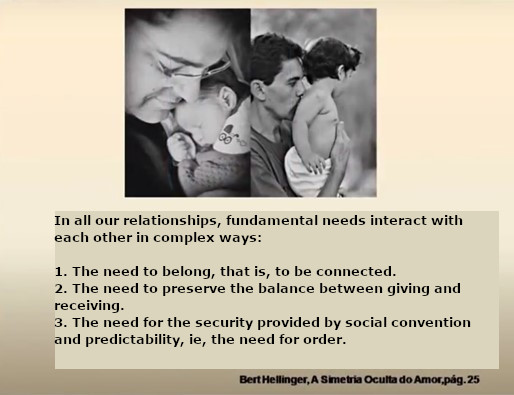
So we saw that belonging, that is, being connected, having a balance between giving and receiving and the need for order is part of every relationship.
Next semester, when we are going to take a course on relationships between us, we are going to see that giving and receiving will be the basis of this reaction.
We’ve seen that everyone wants to be attached to something, wants to belong to something, and attachment to that between give and receive and order is the foundation of all human relationships.
That’s why Bert Hellinger will speak: Order of love, symmetry of love, which are the processes of order that exist in the universe bringing this to the relationship between two.
Contents
Slide 01 – ‘Good conscience’ does not mean good conscience

Now, this order is given by our major conflicts, as Bert Hellinger has already said: The major conflicts and conflicts and day-to-day conflicts.
And Bert always remembers: “A new understanding would be, for example, the perception that great conflicts have their roots in good conscience and draw their aggressive energies from it.”
We have already studied good conscience very well here, we have already studied several times the meaning of good conscience, the meaning when we study our cube, what our conscience is, what our conscience will be.
Our conscience is based on an integral process, collective and at the same time individual, and within this process, good conscience is the one in which we make choices based on what we think is fair, but a fair that is not justice, it is a fair that is related only to ourselves, is the one that we exclude the other, is the one that we think that the other does something wrong and that we are not capable of doing it.
Good conscience does not mean good conscience, liveable conscience, dear conscience. It means that conscience that excludes.
In The Spirits’ Book there is a passage that says that conscience is the basis of the whole process, that it is conscience that watches over, conscience is the caretaker of probity, but it happens that we forget that it is not this awareness that we have here on a daily basis. This conscience that we have on a daily basis is not this conscience that is in The Spirits’ Book because the real conscience is loving, it is affective, it is affectionate, it comes from love. So it’s not this consciousness that we’re based on down here.
(Drawing on the blackboard) Remember that we studied here that we are in that superficial consciousness. This consciousness has a primitive flow or lower, and a higher influx compared to this one.
So, for example, a person who is still stuck with crime and he doesn’t kill is already something useful in development. Remember that this superior here is in relation only to the primitive process, the process that is still tied in the inferior sense.
Here we are going to have the collective part which we tune in, in the same way, a lower part and an upper part which we are going to tune with the collective.
Here is what we have already spoken of as cosmic consciousness, it is unitary. And here is the field of the system that does all the development.
So what is good conscience?
It’s the one we base only on ourselves and judge others as if we weren’t able to do what others do, that excludes us from the problems of humanity, and in that exclusion with a sense of justice we create what Bert Hellinger calls a good conscience.
This good conscience that we think is fair, that we interpret as that passage from The Spirits’ Book, is completely wrong because the passage that The Spirits’ Book talks about is this one (points to the drawing), it is the cosmic conscience, it is the conscience that watches over, the conscience of love, it is not conscience that accuses. This one we can say that the conscience of the devil. What is devil? It means intimate accuser.
We can see that we are constantly accusing ourselves of something, this accuser comes from this mind here, from this primary mind, this primary mind is what excludes people, it creates the great conflicts, it creates the great process of separation, it is going to create the problems in the family field, it is the one that is going to generate the problems of restlessness in the field, it is exactly this conscience, exactly this content that will generate this.
When we are talking about this consciousness, we are talking about these contents here, this consciousness that has not yet become volumetric, this consciousness that has not advanced, this consciousness that is still in development.
So we’re talking about it and it’s what creates the big conflicts because it’s always based on the idea that I’m right and someone else is wrong:
“The other was able to do something that I would never do”. “What the other did is absurd”, and it starts with those little things that happen in everyday life. For example, this conscience is the one that says: “ I’m not late, why are others late?”. “I’m honest, why isn’t everyone honest with me?”. “I don’t lie, why do others lie to me?”.
As if personal order or personal principles were a means of controlling where it lives, that is, I don’t want to waste time living, I want life to have certain frequencies.
So I usually say that people create frequencies, so what do they do?
They do the following: Perfectionists, then, on this basis here:
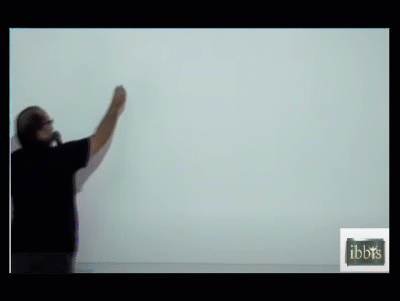
They come here and create frequencies, frequencies of pseudo virtues, virtues 1, virtues 2, virtues 3. And people have to participate in this field, that is, to be able to interact with it, they have to be within these virtues and the world has to be within these virtues.
That is, it controls the environment through a speech of virtue because if you just have the virtue and throw it in the environment, everyone will live the way they live, but that way it controls the environment and then when something happens different from its frequency it is disappointed.
He/she says: “Oh my God, I trusted so much”.
But to live we have to live with our shadow, we have to live with our content, we have to live with everything that life is, life is totality.
I cannot choose certain frequencies and put them on.
So the person says the following: “Look, if you lie to me, our relationship is over, but I love you”.
How do you love if you don’t accept me as I am?
“I love you, now, if you lie it’s over”.
So you do not love me.
Now, I establish a rule because from then on I don’t have to worry anymore, I pretend I don’t see it, I pretend I don’t feel it and the person will relate to me based on that order I gave.
That’s very comfortable and that’s actually not even love, it’s nothing, that’s selfishness and control.
I do not give the right to be what it is, I only accept it if it has the frequency I determined. People do not exist as they are. (That is how we think)
That’s why later I will be disappointed because I exclude. I only accept from you the half that corresponds to my frequencies, then the person will live with that frequency and will live in the world with the other.
And they cannot be discussed, they cannot be analysed and on top of that it says, “I love you”.
The right thing would be: I love myself and I only accept what agrees with myself, outside of that I don’t love.
That is, I am a narcissus. This is narcissus syndrome.
This is what he does to control the environment and to escape the wear and tear that is life. This reaches such a point that it is what the father and mother turn a blind eye to the child’s problem: “Ah, your child is doing this and that”. No, my son doesn’t do that, and he closes his eyes.
It’s what the couple is going on at home and they are denying that it happens because they got so used to living in certain frequencies and staying in it that they don’t accept anything that doesn’t correspond to that there, then the person cries because they were disappointed, that they are naive, who didn’t see how shameless the other was.
We have to live in the principle of totality
We live with the whole. You can have your principles, but your principles don’t have to be the world’s principles, they are your principles.
You can watch over your superior principles, but not as a virtue, but as a means of a transformation process. We are still far from virtue. This is very important, and this is very common today because every relationship is a construction of us, not a construction of I and you alone. It is a construction of us.
Slide 02 – Our mind limit us (habits and conditioning)

(Teacher reads slide)
“What prevents knowledge are the very limits of the mental instrument that the individual has to use to reach it. And overcoming them represents an effort to which the being rebels. The agility to perform such work is the lesser the more unevolved the being is.”
So, the process occurs by the limit of our mind. The tool we use in life is the mind, this is the basic tool of life.
So the whole process of existence is in the mind.
The mind as we have already shown here: (Drawing on the blackboard).
The mind that we call personal is actually interconnected to a collective mind, which in turn is interconnected to a field of consciousness that is collective and this field of consciousness goes all the way to cosmic consciousness where we are heading and consciousness Cosmic life is linked to the system or paradise that Pietro Ubaldi teaches us.
(Drawing on the blackboard) So, this mind that we call personal, it is linked to habits and consequently to conditioning, and we are stuck in this process.
Habits and conditioning.
And we’ve turned that here into virtue and usually virtue is virtue of judgment. This is what we are calling a good conscience. And that good conscience relates to the world through certain frequencies.
It’s what I always say, we have to distrust our mind. Our tendency is to get stuck in this process.
Slide 03 – Inertia – we tend to stay where we are evolutionarily because it is the area that we have already conquered
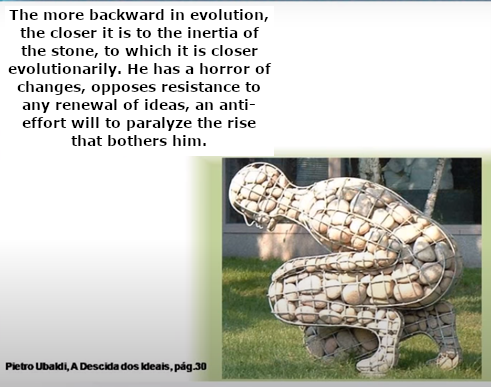
(Teacher reads slide)
“The more backward in evolution, the closer it is to the inertia of the stone, to which it is closer evolutionarily. He has a horror of changes, opposes resistance to any renewal of ideas, an anti-effort will to paralyze the rise that bothers him.”
This image is very powerful and I want you to also take a look at the word.
(Drawing on slide) This right here is conditioning.
We are going to explain a lot in the next classes, we are going to see this phenomenon very well. But I want to remember here that I also said in other classes, that we have three movements: We have a movement that attaches the being to the antisystem, here is the antisystem .
This movement is the movement of inertia, it tends to make us stay where we are evolutionarily because it is the area that you have already conquered.
So this is anti gravity. This is what Jesus taught us: The spirit is ready. Because the spirit is of the system and the system is one, but the flesh is weak. That is, the antisystem, the personality is weak because it is trapped in inertia.
This inertia appears in our life as conditioning, as I live as a frequency of coexistence and this becomes law within us, this is what forms Bert Hellinger’s good conscience.
At the same time, we have an impetus given to us from the self through the grace that is present in everything and renews us all the time, within that theory that we have already spoken so many times about the firefly, appearing and disappearing, materializing and dematerializing.
Grace is always present and here we have our creative effort, which is an effort to change, not a mental effort: “I’m going to create a new being, I create him here in my mind and I keep fighting with him in my mind”.
No, it is not that being.
When I’m talking about effort, it’s not me creating an image of myself analysing this image and comparing what I am with it.
Generally, what do we do in our conscience? Generally what do I do for a living? (Take student as an example)
I take an image of myself and put the most perfect image of myself and here I compare myself with what I would like to be. So, I look here and compare it with what I created, and then when I spend a week being this one, I think I’ve changed.
“I’m calmer, thanks to the spiritist doctrine I’ve changed a lot”, those stupid things we say, because in fact you created a mental image and you’re always struggling with that mental image.
When you can’t get here, you say: ‘Oh, I’m hopeless, I’m really no good, I’ll never change’.
No, self-knowledge is not image creation, it’s the opposite.
It’s you looking at everything you are, including your potential.
It is the constructive, creative effort that overcomes inertia, that assimilates grace, that studies its components, that forgets the past, that leaves the past, that leaves the mind free even from its own concepts, that has no attachment even to the concept, not in your way of being, not in what you know, not in your intelligence, nothing.
At each point it gets rid of that as if it were a rocket that is going up and leaves certain elements that only weigh.
So, this inertia here within this concept of thinking about habit and conditioning, creating frequencies that you call virtues, is good conscience, and this good conscience always excludes the other because it is not airy with creativity, it is not airy with love, it it is not airy with goodness.
That’s why it looks like a stone as Pietro Ubaldi says.
Slide 04 – We stagnate because we feel safe in that position that is already known

(Teacher reads slide)
“This tendency towards stagnation is called misoneism and is due to the impulse that the subconscious has to cling to what it has stored in the past, which represents the safest line of conduct because it has already been proven by existence and forms its heritage that cost it so much effort to conquer. So he prefers, out of laziness, not to build another patrimony, when what he already has is enough to live on.”
Because as the evolutionary process came, the evolutionary process is tiring, it is millenary. So when the being reaches a certain point, his tendency is to coagulate at that point, remain at that point and not change.
To change, think that the point where I am is the point of virtue, “I am right, the other is wrong and what the other does I do not do and I do not belong to those trends”.
From there I create conflicts, I create exclusion, I create the will to exterminate. This is how we form our minds.
During class someone asks:
One day the spiritual mentor told us the following: Each one reaches their own truth, but that truth can at least withstand the truth of others. It’s well within that process, isn’t it?
Teacher replies:
Yes, we have to understand the following, that for now, truths are relative.
In fact, there is only one truth, but as we are evolving, truths are relative, but generally they are collective. And the truth of each plane of life is different from another plane.
I can be in a plane of life where strength is the basis of my existence, the other can be in the plane of life that cunning and lies is the basis of his existence, the other can be within the field of righteousness is the basis of existence from him.
Every human being is in such a process.
There are some who are in the transition between lying, cunning and righteousness.
He’s not just from here and not just from here, he’s in transition, I call that a transition man. There are others who are here with strength and cunning, when he can’t solve something he resorts to cunning, so he attacks, he kills. So he’s here in the transition between two fields.
So, each one of us will have a truth that is the evolutionary level where he/she is.
In a little while we will see on the slide that Pietro Ubaldi talks about this.
How does this process take place in terms of evolution?
It comes from strength, from the use of primitive strength that Ubaldi calls beast or what people call Rambo.
So much so that you can see that it still moves us a lot. You see that every movement of force that exists in the world moves us. So, if we see a fight on television, you’ll see strength. If you see a dispute, you will see strength. If you go to see a movie that has a lot of murder, a lot of death, the guy who wins in the end is strength.
Because this is in our subconscious. In the basement of our soul, strength has always been the element we most trusted. So our primitive consciousness believes in force.
Bert Hellinger’s will to exterminate comes from the strength that was the basis of our entire lives.
In the process of social organization, force was the base and the newspapers are full of deaths, of murder that is nothing more than the use of force that has always been our basis, has always been the basis of revenge, has always been the basis of rivalry , has always been the basis of conquest.
So, this one is still very present in our soul, this force evolves and it then goes to cunning and to the lie that already advances because you are not going to exterminate the other. You can do harm with lies, with slander, you will be cunning at the same time, you will steal and put it in a good way, you will do a lot of things under the rug and sell an image of virtue, so this is cunning.
It is already a slightly more evolved method, until you come to your senses that this method only generates pain. And then, by evolution itself and by maturing itself, you enter the field of rectitude: What you say is what you seek to do, what you act is what is true, what you conduct yourself in life is what you truly say and do.
Then you start in the field of rectitude, that rectitude that releases from pain.
Then we leave this world, but each one of us is in the middle, so it’s no use wanting a transitional man between lies and cunning to preach and put a way for everyone to act in my midst.
If you’re going to have some strength, you’re going to have some cunning.
It’s what João just said, the truths of each one, relative truths, psychic truths, truths of personal content. And it’s no use saying that I don’t do what the other did, we’re evolving.
If I’m not doing it now, it’s because I’m not on the test board of situations I can take myself to do. And if I don’t do it now, I have to remember that I did it yesterday and I can do it tomorrow.
The tendency is to stay in the stage where it is, that’s laziness. So we can say that the basis of our psyche is laziness, it’s inertia.
We make up a lot of excuses, you say: Ah, but why don’t you pray? I’m not having faith.
Why don’t you read? My mind doesn’t focus.
Ah, but I’m tired, I don’t even like to see others, I just want to sleep.
That’s how it goes. We make up a lot of excuses.
But why are you like this? “Because my husband is very selfish, because my daughter enslaves me, because my life is my life”, and she goes on talking.
And you start to believe these lies, but the psyche doesn’t believe it, the psyche starts bombarding you through dreams, contents, inner processes and you go: Anxiety, restlessness, depression.
There’s no way, you’re going to have to leave this framework because you believe in it yourself.
Then you start to play on the other and place yourself in the person who was invaded, who was offended, that you no longer have the strength to react.
During class someone asks:
When we observe this type of behaviour within our family and on our part too, but let’s put it in relation to children who are someone we have to care for and protect: Do we respect and educate at the same time, serving as an example? What should we do?
Teacher replies:
Small talk.
These are things that have to be talked about, have to be talked about.
Love always does something for someone and we are still far from giving examples, so what do we have to tell? With conversation, with understanding, with dialogue, with the natural tensions of life, with calling, speaking, saying, showing, but not allowing.
It’s not that the person has to do that, because many times we talk and we are telling them to do what we want because then we stay calm.
You can look that you don’t care about the children who don’t give you problems, if they’re fine, if they’re bad, no problem, let it go.
Now what is the problem: What can I do to solve my son’s problem?
Go see you are the problem, you are the problem.
So what do I do? I want rest, leave me please.
And we come to say that, don’t we? I need a break.
It’s like when we take care of a patient for a long time, he dies, then the person says: Thank God he rested.
Then I speak: who rested? You or him?
Is this “thank God” because you got rid of him and no longer need to take care of him or is it because he “thanks God” rested?
He rested me, thanks God, he left. Decreased my weight.
Slide 05 – Forgetting the past I walk to the top
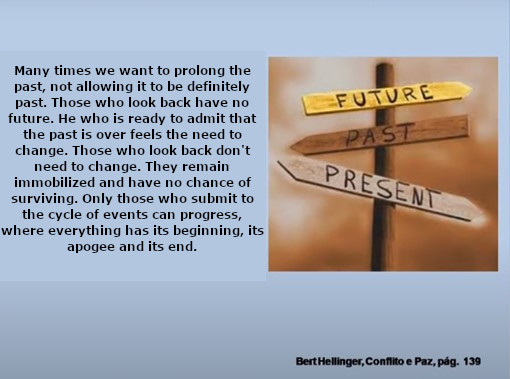
(Teacher reads slide)
“Many times we want to prolong the past, not allowing it to be definitely past. Those who look back have no future. He who is ready to admit that the past is over feels the need to change. Those who look back don’t need to change. They remain immobilized and have no chance of surviving. Only those who submit to the cycle of events can progress, where everything has its beginning, its apogee and its end.”
Pay attention to what I’ve been talking about here a lot.
Look what Bert says (read slide)
(Drawing on the blackboard) Generally, our life is divided like this: within a cycle that goes from 0 to 20 years, from 20 to 40 years, from 40 to 60 years, 60 to the cemetery.
So, our life more or less divides into a cycle like that.
This cycle that goes from 0 to 20 is a cycle of development, here is based on physical development, development of the mind, development conditions.
From 20 to 40 years old, it is the field where we prepare.
From 40 to 60 is where we fulfil our role in the world, this is where we will carry out our mission on earth.
And from 60 onwards we complete and die.
Generally, this phase can happen earlier, but always more or less on this model, always 20-year-old models.
For example, I was curious to study this process in the lives of several people.
(Drawing on the blackboard) So, for example, Allan Kardec fulfils his function here at about this age and his task lasts around 14 years.
Bezerra de Menezes lasts around 14 years.
Francis of Assisi lasts around 20 years.
Chico Xavier, he will receive his books, his first book was in 1932, it will be the edition of Poetry from Beyond the Grave, his last important book in the sense of revelation is from 1958 to 1960, which is Between Earth and Heaven, that is 26 years.
After this phase, when he moves to Uberaba, he will receive the book Comfort, he will receive messages, he will guide and console people.
So this process is a common process.
Look what a short pattern looks like. If you don’t observe it, you pass by it and won’t do your job and life prepares you in every possible way so that when you get here, you start to fulfil your task. So you have to be well prepared for the change.
(Drawing on the blackboard) If life is made of cycles, what happens?
Let’s take here from 0 to 20: I form a personality, when I reach twenty, I have the personality that arrived in adulthood.
So, these cycles should be overcome, but they are not. The childhood traumas, the youth problems are all in here like baggage. I say that we see those wanderers who walk on the street and go looking for it in the garbage, and they think that it has value, they put it here in the bag, many times they even put it in a cart to help and they go looking for it all their lives, this is us, we do this. And here it is full of trouble.
Then, as there is no other way, you say: I am like this because of my father, my mother never loved me, my father never protected me, my grandmother was mean. Oh well. You make the bag here, the past does not die.
Then you enter here from 20 to 40, there you come. You start here with the wander and you go, you get here and you form a wander with much greater weight, you don’t get rid of anything from the past.
Personality has to be built, developed and die.
Her cycle ended, then you take it, do it here, when you turn 40 you look like an old woman with all this luggage here and the past being conserved and the past being nurtured, the squeamishness, the hurt, the anger, the hate, all inside the bag.
When you start your real task, you’re already old, tired and don’t want to know anything else. So when you enter the cycle here (Drawing on the blackboard) from 40 to 60, what do you do? You keep mulling the past all the time and growing up as a wanderer, you now has an enormous fortune, a lot of rubbish. Then you say: I lost faith, I lost the will to do things, the ideal, human beings are very bad.
Then you keep thinking these nonsense.
Because in each such cycle, this personality ‘A’ should have died, this personality ‘B’ should have died, this personality ‘C’ should have died.
Each personality cycle only served that purpose.
It was formed, reached its apogee and disappears. (Drawing on the blackboard) to disappear what do you have to do? A general balance of this period here, forgive, forget, move forward, go after the brother who wronged you in order to reconcile, not carry weight.
So when you disincarnate, you disincarnate like this: (Drawing on the blackboard) Wanderer of life, and here is hurt, resentment, offense, anger, hatred, bitterness, and there you go.
And it’s always the other’s fault, and when you come back to life, you come back with that content because it was with that content that you left.
Spiritual life will have other developments, but you come back to the point immediately after this one.
That’s why Jesus was so clear: Each day has enough trouble.
You have to end these cycles. With each great cycle of your life you end it and start a new personality, start a new being.
That’s why Paul of Tarsus was so nice when he says: Forgetting the past I walk to the top.
We have to give a chance for the past to be the past, for the past to die.
During class someone asks:
For example, in the childhood phase, which is where we have a lot of information, it is where the main traumas are found, we generally cannot study the childhood phase in this period from 0 to 20 years, even because we do not have the maturity to come of age.
And when you reach that age of 20 sometimes you repress a lot of past memories or you can’t work it out within yourself. How do you end the cycle at the age of 20, with many traumas you don’t even want to talk about or don’t even remember because of the repression you have?
Teacher replies:
(Drawing on the blackboard) Let’s assume that you put here from 0 to 7, from 7 to 14 and 14 to 20 and 21 years.
We have a terrible view of the world, we think that young people are in the world to enjoy the world. Enjoy the world means enjoy the evolution.
If we had development here, and really here are the greatest traumas and these traumas remain within the field of consciousness, remain within the field of the unconscious field, of our soul, what was once conscious, became unconscious, I call it syndrome of the ring.
What is ring syndrome?
The child does this.
(Drawing on the blackboard) In here is the trauma and it closes one fact with another in a way that it disappears from the conscious, it remains in Freud’s preconscious, what was once conscious and came here. So what happens? Remembering that our view of unconsciousness is much broader than Freud’s. So here it is preconscious and it disappears, he suffered a trauma, he suffered abuse, it does not appear in consciousness, it disappears because the child has no defence. When it suffers, it suffers 100%.
(Drawing on the blackboard) So, the tendency is to join, that’s why I call it the ring syndrome because a part here joins with this one and this content stays here, so this content will generate trends up here, it will generate restlessness, it will generate anguish from processes that do not know where it comes from.
Now, where should it be resolved?
Between 7 and 14 years old, because at that age he can begin to develop the vision of belief, he can acquire the vision of life, he can begin to acquire the vision of existence. This should be studied at school, so that it helps little by little to achieve superiority.
By the time he reached adulthood, he had a new personality ready to fulfil its potential.
But the truth is, we only accumulate. We keep accumulating trends, accumulating processes.
“Ah, he is very young, he is in the fun phase”. Well, I should say the opposite, he is very young, he is in the phase of studying himself, studying life.
And the people who are witnesses of this child’s evolution should have greater support here for its development.
(Drawing on the blackboard) So it should start this cycle from above from 20 to 40, that’s why I gave that course of our trajectory, so from 20 to 40 with possibilities of development instead of weight.
This process that creates inertia, and then today as people are already starting to study this, instead of being liberating, it plays in the past.
He learns that the traumas often come from the relationship between the father and mother. “Oh, no, I’m like this because of my father and my mother”, if you learned that it’s to free yourself, it’s not to enslave yourself.
It’s the same as someone saying: This comes from past reincarnation.
If you know that come from past reincarnation and reincarnation is for change, why haven’t you changed yet?
How many people talk like this: I have a relationship problem with my daughter and my husband that I think is from a past reincarnation.
If you know it’s from the past why didn’t you fix it?
That’s what you’re here for, not just another excuse.
Now the excuse goes to the past, to the past reincarnation, it goes to my mother’s lap, it goes to my father’s lap.
Trauma may exist, but you have the ability to recover.
Life regenerates everything, why wouldn’t it regenerate the psyche?
During class someone asks:
And in this case, the parents, do they have to be very quick to be able to treat these traumas in the sense of talking to the child, even if he is young?
Teacher replies:
Here the role of the parents is fundamental.
From true educators, from true psychologists.
(Drawing on blackboard) Now what do they do these days? Transfers responsibilities to another person. Transfer it to the school, transfer it to the doctor, transfer it to the psychologist.
It’s like taking her son to a workshop, she can count on the support of these instruments, but nobody replaces her.
You can take it to the doctor, you can take it to the psychologist, you can help it in this process. The professional is an aid tool and not a solution tool.
(Drawing on the blackboard) And nowadays it transfers to everyone, doesn’t it? Transfer it to a nanny, transfer it to grandma. It’s the laziness that we talked about here.
During class someone asks:
When I go through this period of preparation and enter the phase from 40 to 60, what are the signs that life gives me to be able to identify my role?
Teacher replies:
(Drawing on the blackboard) The role in life is given by what life has allowed you to prepare or what you have managed to prepare.
So, let’s assume that you studied here, joined some university courses, developed your intellectual field, started an action in relation to the other, what you accumulated from 20 to 40, that’s where your mission lies.
Anything that happens from 40 to 60 will use these resources here and add these resources.
You may have taken some courses and suddenly life takes you to do something else, but what you have absorbed will be used there. It’s no use for you to come and deny this here, you have to add what you acquired here.
Let’s suppose, I took a course, worked, for example, I was a lawyer. Well, this lawyer thing got me tired, I’m going to take another course to be a doctor here.
Very well, but remember that you are going to be a doctor here and combine it with your knowledge of the past there so that this whole process is useful in the field of life. Every experience can be well developed.
So, it is generally a continuity with the specification where you will fulfil this function in the various areas of your life.
Function as a son, as a husband, as a father, as a citizen, as a spiritual agent, your various functions.
So, you just have to look at what you developed from 20 to 40, which is a trajectory that you will have to qualify.
You can change this trajectory, you can add this trajectory, but this content that you assimilated is the content that you will use and life will use you here because life is utilitarian. Why is she going to prepare you for 20 years if you’re not going to use anything in it?
Life is utilitarian, incarnation is very short, so life is utilitarian, it would not let you have all possibilities of development.
Now, if you went to inertia, let’s assume that here you would be a doctor, but you didn’t do anything for it, you didn’t study, but still you’ll work with people, but you’ll be a butcher, you’ll work at the counter serving people. It will not fail to serve people, but in another mobility from the one that you didn’t make enough effort to get here.
Then life will change, not the principle, but the function.
“I didn’t study or anything, the best I could do was be a civil servant, I’ll sweep the street”, so you’ll take care of health by sweeping the street and you’ll relate to people within that role you held.
During class someone asks:
In this phase from 40 to 60, as you were explaining, if he had to be a doctor and he didn’t take a medical course, can he still do it?
Teacher answers;
Can, he can do.
(Drawing on the blackboard) I mean, he’ll have to play this for later here. So he will have to take good care of his physical body so that he can extend this period.
He comes from 40 to 70 years, 40 to 80 years.
He will have to prolong this phase, he will have to take care of his body so as not to disincarnate beforehand.
Student asks:
But he can, at the same time he is specializing, like you said while studying medicine, still be dealing with health by doing other functions.
Teacher replies:
Yes, doing other things.
This means that it is not discrediting other professions, this is diversification of what you do in life. Not in terms of diminishing any profession, far from it.
Slide 06 – The way out of the past is spirituality
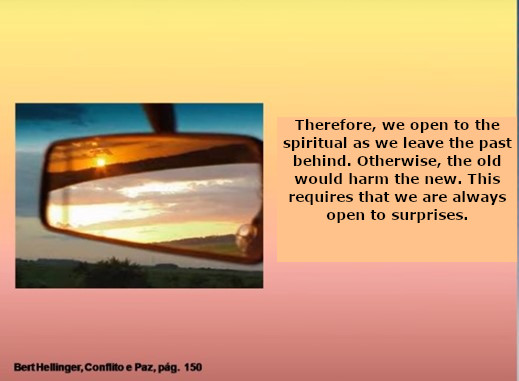
(Teacher reads slide)
“Therefore, we open to the spiritual as we leave the past behind. Otherwise, the old would harm the new. This requires that we are always open to surprises.”
There’s the remedy.
To leave the past behind you have to open up to the spiritual dimension.
So when the past remains, it’s because you haven’t opened up.
You can be a hot-headed, you can be going to church, to mass, to the spiritual centre all day long, but that doesn’t mean opening yourself up to spirituality.
It just means church attendance.
It’s totally different, it’s an inner movement, it’s what Bert calls the Movement of the Soul, what comes from the origin of the system, it’s the movement of the soul, movement in search of life.
So the way out of the past is spirituality.
(Teacher reads slide) That is life. And it is not trying to control the environment by emitting frequency and virtue.
So, open yourself to the spiritual Bert Hellinger’s recipe. It is the way to forget the past or to overcome the past.
When we talk about forgetting the past, it’s not forgetting the facts of the past, it’s removing the psychic facts that were condensed in our soul, the mental cores that we’ve talked about so many times here.
Slide 07 – Intelligence, conscience and means on the path of spirituality is Ubaldi’s recipe
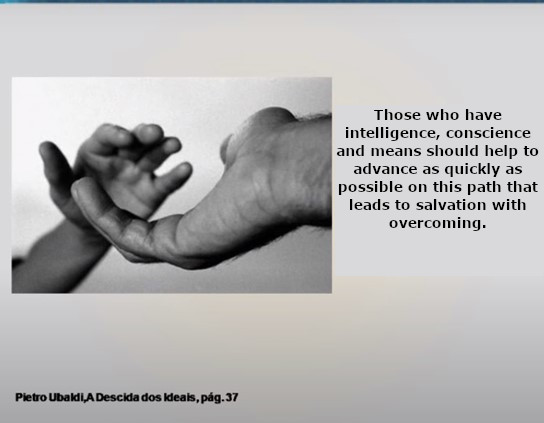
(Teacher reads slide)
“Those who have intelligence, conscience and means should help to advance as quickly as possible on this path that leads to salvation with overcoming.”
So apply our intelligence and help others.
Intelligence, conscience and means on the path of spirituality is Ubaldi’s recipe.
You see that it is very close to what Bert Hellinger teaches.
So many times your task, your function is the spiritual development that you never did in any reincarnation.
You often lived countless lives just day by day, in life, in the events of the world, what I call a horizontal life.
How is that? (Drawing on the blackboard)
We have a life that is the horizontal life, which is the life that happens because of the facts of the world. Here you come and do something, here you come and something happens and the facts of the world keep happening, It’s life in the horizontal sense, you get stuck in it.
What matters is what happens in the world, what you do and the facts that occur, but life develops horizontally and vertically.
The vertical is spirituality.
(Drawing on the blackboard) There are two worlds being developed: One is the development of the intimate world and the other is the development of the functional world, you in the world and you in yourself.
Slide 08 – The reasoning of the “good conscience”
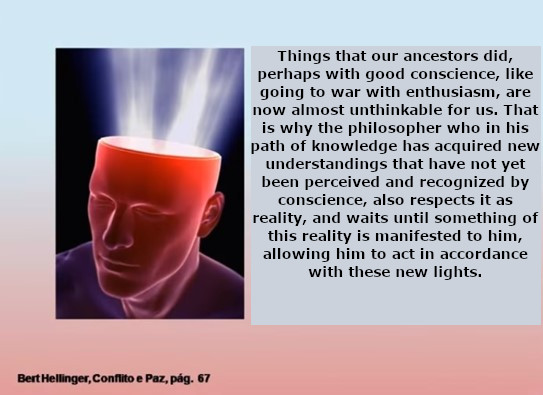
(Teacher reads slide)
“Things that our ancestors did, perhaps with good conscience, like going to war with enthusiasm, are now almost unthinkable for us. That is why the philosopher who in his path of knowledge has acquired new understandings that have not yet been perceived and recognized by conscience, also respects it as reality, and waits until something of this reality is manifested to him, allowing him to act in accordance with these new lights.”
Formerly there was slavery and good people thought that slavery was okay and that the slave was property.
As we developed our awareness, we saw the absurdity that this was and today the absurdity that we see in slave labour that we still find in the world. So, the collective consciousness no longer accepts that.
In the same way, today for us it is often a natural process to exclude a person from a group and to exclude a person from the family for this or that reason, as if we were being fair.
In the same way that someone punished the slave and thought he was fulfilling his function, the slave was a fugitive, the slave did not obey, he had to be punished.
And this linear reasoning was logical because it is the reasoning of a ‘good conscience’.
Today people think that taking revenge, remaining indifferent, hurting oneself all one’s life, excluding is natural and fair because there are still no new lights in the conscience.
These new lights often do not arrive in one way or another, but arrive through concepts, through meditation, through prayer, through a certain opening that you give to the new until you come and conquer it.
So those who, like the philosopher here, can be in front of a vision, can offer a vision that tomorrow will be the vision of our life, but for that we have to leave the past and to leave the past we need to spiritualize and develop the potentials of our existence.
Slide 09 – In systems of human relationships, repressed resentments are slow to surface in those who have shown themselves to be least capable of defending themselves
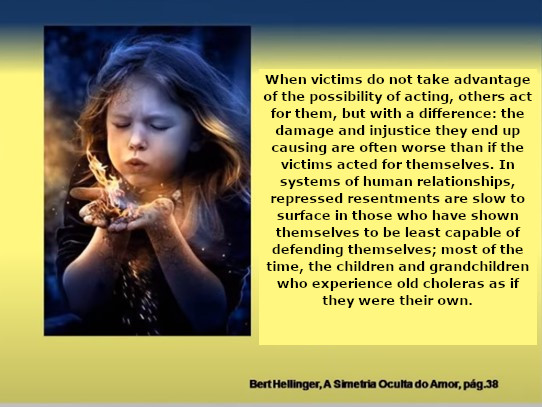
(Teacher reads slide)
“When victims do not take advantage of the possibility of acting, others act for them, but with a difference: the damage and injustice they end up causing are often worse than if the victims acted for themselves. In systems of human relationships, repressed resentments are slow to surface in those who have shown themselves to be least capable of defending themselves; most of the time, the children and grandchildren who experience old choleras as if they were their own.”
(Drawing on the blackboard) So, here’s one more case: If we are in a familiar field, then the content of the past is within that field.
If this field is collectively not clean, that’s why the spiritist movement of the spiritist doctrine talks so much about the family home evening, and people think that the gospel is just reading a lesson, saying a few things, saying a prayer and leaving, but no, the evangelical cult in the home is the cult of cleaning the field.
It’s the cult for vibration for those who are in trouble in the field, it’s the cult that makes new images so that the family works in balance.
We routinize family home evening as if they were simply going to do a reading, an evangelical comment, usually a lie, which is what you don’t do, say a prayer and leave.
No. It cleans the field, it preserves the field, it adapts the field.
(Drawing on the blackboard) This would also be the moment to launch new images so that harmony could be restored.
It is at this moment that the field should be completely cleared because this content from the past, remaining here, will find a representative who will assimilate it in the present process or in the future generation.
The past will be preserved inside the field, just as we, as individual consciences, do what the wanderer does, Santa Claus bags full of trinkets, hurt, this and that, the field also does. Preserves family traditions, preserves family contents.
And the family home evening that should be like a family constellation. It is in that problem that harmonizes the family through dialogue, it is in that moment that harmonizes the family through meditation and prayer, in that moment that the spiritualization of the family and the ordering of the image should open.
It would clean this field, so it would be a collective care action towards the field.
During class someone asks:
Like an Isaiah effect?
Teacher replies:
Yes, like Isaiah effect.
If you don’t know the Isaias effect, just buy the book, which is a work done with prayer to be able to help in several cities and it was a work tested even in New York, if you don’t know it, just look.
It is the prayer diminishing the effects of violence in the city.
So, our groups should do that and we could do the complete cleaning of our house by renovating the family field.
You say: No, but the others don’t do it.
But it doesn’t matter, if you do it, you’ll be ordering the image, it will have an extraordinary effect, just like what happens in the constellation, the person who is often making the constellation, the person who is connected to it, doesn’t even know what’s going on.
So let’s have this vision that is the way we treat our field, treat our world.
Slide 10 – The struggle ends with our return to God

(Teacher reads slide)
“The struggle was born out of the split in dualism and cannot disappear until this split is healed and dualism is reabsorbed in the reunification of everything in the S (system), with the return of everything to God.”
Now we are going to start studying where this process came from.
Why is there a good conscience? Where did it come from? Why do splits happen? So, we are going to see that it emerged from the fall, from the anti-system;
So let’s take a long view to start studying this whole process.
For that, we’re going to have three classes that will refer us back to all this knowledge.
So we’re going to leave that for after you’ve attended these three classes to come.
Guys, good night :).
Original lesson produced by TV IBBIS on YouTube 26/05/2013 : https://www.youtube.com/watch?v=Qt6urq9vv2U&list=PLLqqrKEkP5MQx3q4Cekld95vc__jaQV16&index=9
